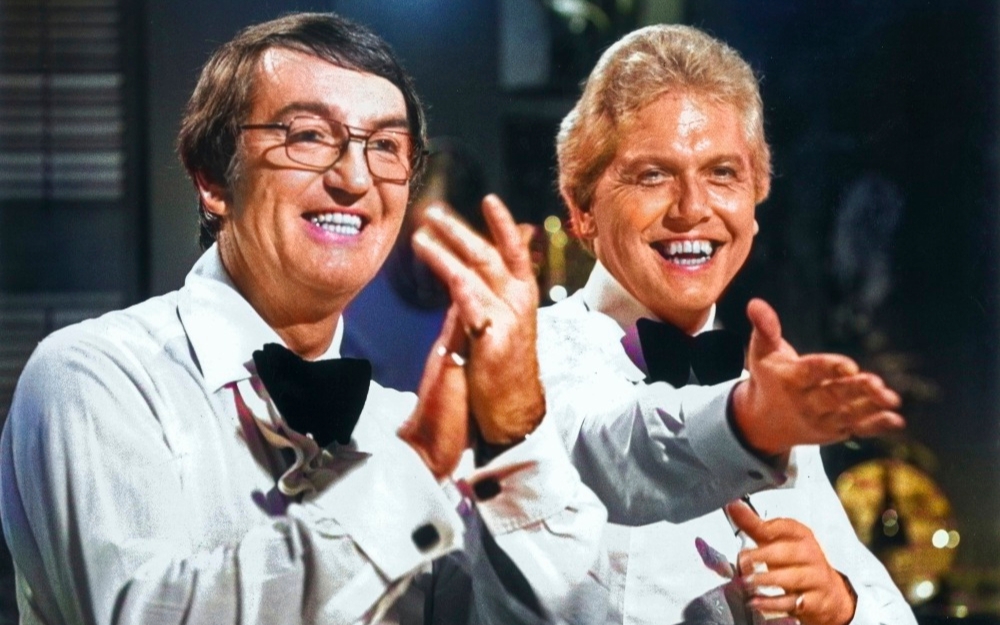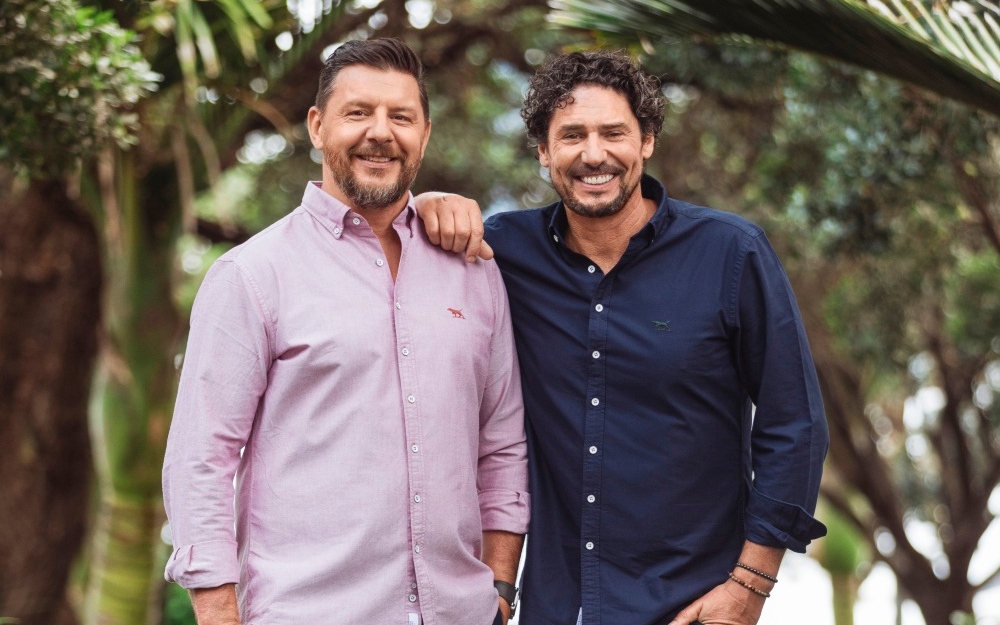The year before, David’s partner in life, love and outrageous gourmet adventures, Peter Hudson, had also passed away.
And so it was that after dual showbiz careers – during which the over-the-top twosome even managed to convince Kiwis that combining strawberries and cabbage was an excellent idea – the party was over.
And what a party it was. Few Kiwis over a certain age will have forgotten Hudson & Halls, as they were known. Famous for bickering and squabbling at each other like the old married couple they not-so-secretly were, they barged their way onto our TV screens in the 1970s, when homosexuality was a crime, punishable by up to two years in prison.
“Are we gay?” Peter once said to a reporter who asked a prying question about their domestic arrangements. “Well, we’re certainly merry. No question about it!”

At the time, Kiwis had no idea that a couple of flamboyant gents accidentally setting their kitchen on fire and announcing, “If you’re confused, so are we, don’t worry!” was what they wanted in a TV show. But as soon as they got them, they wanted more, more, more.
Of course, none of it would have happened if it wasn’t for Melburnian Peter deciding to visit an old friend in Auckland in 1962. Across the room at a party, he locked eyes with flaxen-haired Brit David, six years his junior, who’d immigrated to Aotearoa three years earlier. It was love at first sight.
Soon, Peter returned to live here permanently, the pair buying a small cottage in Auckland’s historic Parnell and decorating it from top-to-toe in daring burgundy.
For years, they owned a shoe shop and a fancy ice-cream parlour in Queen Street’s upmarket Strand Arcade, and threw extravagant dinner parties for their friends.

At work, their explosive arguments were legend, with neighbouring shopkeepers lending a sympathetic ear while one or the other vented, “It’s really over this time!” and then being perplexed to find them, the next morning, acting like nothing had happened.
As the ’60s morphed into the ’70s, Peter and David moved with the times, once hosting a do where David stood at the door and handed everyone a kaftan to change into before being handed their first cocktail.
Parties were their life blood and it was at a soirée in 1975 that they got their big break – they got chatting to someone in TV and before you could say “Beef Wellington”, they’d auditioned for a cooking segment in an afternoon magazine-style TV show.
The gig was for just 10 minutes, once a week, but David – the more fame-hungry of the two – was over the moon when they were given the thumbs-up. Bumping into a friend on Queen St, he shouted, “I’m a star! I’m a star!”
He might have been a little premature, but he was right. The audience loved the pair’s endearing, slapstick humour. The following year, they were given their own 30-minute daytime show and the year after that they were prime-time superstars.

For the next decade, Hudson & Halls were A-listers in Godzone, gracing magazine covers, publishing cookbooks, opening a restaurant and entertaining audiences on TV. They famously drove a three-tonne classic Bentley, despite neither having a valid driver’s licence.
Eventually, the pair left the suburbs and bought a lifestyle block in Leigh, just north of Auckland, where they continued to entertain friends with booze-fuelled parties.
Restaurateur Tony Astle once recalled being a guest at their country estate when Peter and David were doing their “gentleman farmer” routine. David decided to let the doves out of their coop and, unfortunately, they were immediately slaughtered in the air by birds of prey.
Peter was so incensed by David’s act of stupidity that he threw a TV, a microwave and a sofa into the pool. Like their myriad other domestic explosions, during which friends would witness them saying things such as, “I’m bloody going to leave you,” they soon recovered their equilibrium. David once wrote to a friend that he was so happy, he felt guilty.
In 1987, the pair began splitting their time between New Zealand and England, where they were given a cooking show on the BBC.
While Kiwis had adored the duo’s campy schtick, British critics were brutal. One called them “a couple of ageing chorus boys who can’t open a can of lychees” and another labelled them “naff on roller skates”.

Stirring the pot with fellow TV cook Alison Holst.
Audiences disagreed. Their first series attracted three million regular watchers and by the end of their second series, they had 10 million. All in all, Hudson & Halls ran for four seasons in the UK.
Behind the scenes, however, things weren’t so rosy. In 1987, Peter was diagnosed with prostate cancer. Fearing the worst, he’d gone to his specialist’s appointment on his own because he knew how deeply it would affect David, the love of his life.
Once his worst fears were confirmed, he shared the news and the pair faced the anxiety and despair together. They were thrilled when, after radical radiotherapy treatment, Peter was “in the clear”.
In 1991, however, by which time the duo had based themselves full-time in the UK, Peter suspected the cancer had returned and once again, not wanting “David to have the shock… the reality of it all”, he asked a friend to accompany him to see his London specialist.
As he suspected, the news was grim.
David threw himself into caring for Peter in his final months. He kept a diary and in August 1992 wrote, “Peter home. Looking bloody good, a full sandwich with two slices of mortadella, a chocolate and tea.” Forever, the gastronome.

On September 12, 1992, Peter, 61, died in David’s arms.
David was inconsolable but still made one last, lonely UK television appearance in which he wore a striped shirt and spotted braces at the stove top. But it was apparent to all who watched that his heart was broken.
On November 24, 1993, two friends found David, 57, dead in a bedroom of his London flat with a photo of Peter in his hand.
Although David was English and Peter was Australian – and their last years were spent mostly in the UK – it was New Zealand that mourned the most.
Peter Hudson and David Halls had entertained us, taught us to cook and made us weep with laughter. And more than that, they’d helped change attitudes in Aotearoa towards homosexuality.
Without asking for it, in their heyday they became role models for gay men struggling with the prevailing “don’t ask, don’t tell” mentality.
They didn’t talk openly about their sexuality, but they lived their lives in the public arena as an unapologetically gay couple and that counted for a lot.

With David’s death coming so soon after Peter’s, the nation grieved.
Months after his death, it was up to David’s sister, Janet, to fulfil her brother’s last wish. He’d wanted his ashes, together with those of Peter and their two deceased Burmese cats, to be scattered in a central London park, near Horse Guards Parade.
As she, her husband and their youngest son approached the assigned area, with the ashes all mixed together in a Harrods bag, it occurred to them that what David had stipulated in his will might be prohibited.
“I just mixed them around with the daffodils,” she later shared with author Joanne Drayton, who wrote the book Hudson & Halls: The Food of Love.
“I bet David was looking down, saying, ‘Silly buggers, they’ve gone and done it!'”
HELPLINE INFORMATION
Need to talk? 1737 – free call or text 24/7 to talk to a trained counsellor
Lifeline – 0800 543 354
Depression Helpline – 0800 111 757
Suicide Crisis Helpline – 0508 828 865 (0508 TAUTOKO)
Healthline – 0800 611 116
Samaritans – 0800 726 666
Information about suicide prevention can be found at mentalhealth.org.nz/suicideprevention


